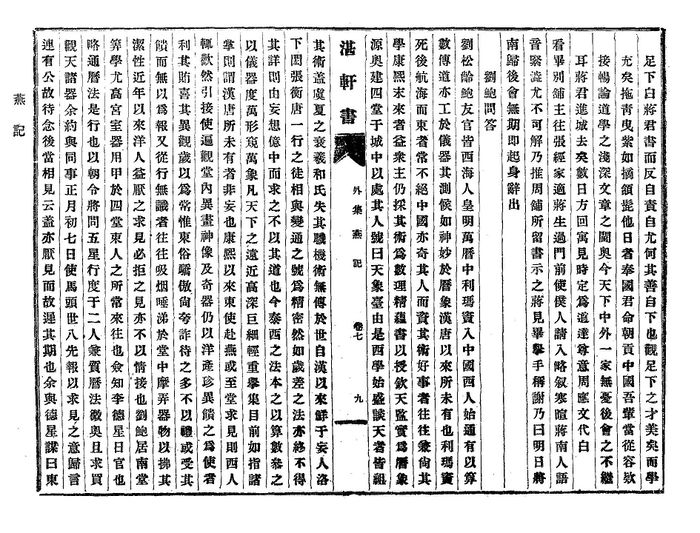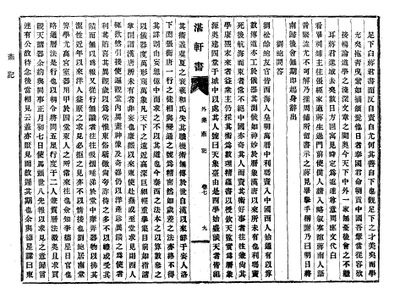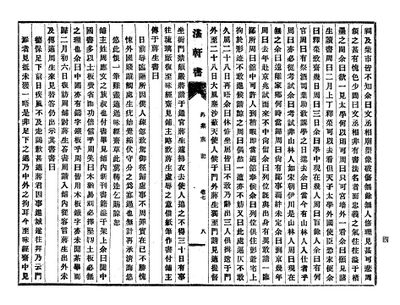"(Translation) 劉鮑問答"의 두 판 사이의 차이
2bthebridge (토론 | 기여) 잔글 |
2bthebridge (토론 | 기여) 잔글 (→Original Script) |
||
| 30번째 줄: | 30번째 줄: | ||
(translation) | (translation) | ||
| − | Liu Songling 劉松齡 and Bao Youguan 鮑友官 are all from Western Sea. During the reign of the Emperor Manli(萬曆 r.1573-1619) of Ming Dynasty, Li Madou 利瑪竇 came to China. Thereby exchanges with the Westerners began. They[The Westerners] propagate their teachings by the means of mathematics, they are also skilled in astronomical devices. Their astronomical and meteorological observations are miraculously accurate. As for the delicacy of their calendar and meteorology, there was nothing like that since the era of Han and Tang dynasties. After the death of Li Madou, those who crossed the sea toward East never stopped coming. China also highly regarded them and utilized their skills. Those who are fond of meddling / Curiosity-mongers often revered their learning. In the later period of Emperor Kangxi [康煕, r.1662-1722], even more westerners came to China. The Emperor collected their skills and composed the book ''Shuli jingyun'' [數理精蘊, Essence of Numbers and their Principles] to pass it to the Imperial Board of Astronomy 欽天監. Indeed, this book became profound basis of calendar and meteorology. | + | Liu Songling 劉松齡 and Bao Youguan 鮑友官 are all from Western Sea. During the reign of the Emperor Manli(萬曆 r.1573-1619) of Ming Dynasty, Li Madou 利瑪竇 came to China. Thereby exchanges with the Westerners began. They[The Westerners] propagate their teachings by the means of mathematics, they are also skilled in astronomical devices. Their astronomical and meteorological observations are miraculously accurate. As for the delicacy of their calendar and meteorology, there was nothing like that since the era of Han and Tang dynasties. After the death of Li Madou, those who crossed the sea toward East never stopped coming. China also highly regarded them and utilized their skills. Those who are fond of meddling / Curiosity-mongers often revered their learning. In the later period of Emperor Kangxi [康煕, r.1662-1722], even more westerners came to China. The Emperor collected their skills and composed the book ''Shuli jingyun'' [數理精蘊, Essence of Numbers and their Principles] to pass it to the Imperial Board of Astronomy 欽天監. Indeed, this book became profound basis of calendar and meteorology. The Emperor also constructed four churches inside the capital and thereby provided them a residence bestowing the title Tianxiangtai (天象臺). Because of this, Western learning flourished [in China] and all those who concern astrology referred to the western technology. .................... Since the reign of Emperor Kangxi (康煕, r.1661-1722), Korean envoys to Beijing would visit the church and ask for an observation. Then those westerners would gladly welcome and lead them into the church, let them tour inside showing them exotic paintings, icons and ritual vessels. Besides, the Westerners would present them extraordinary products from the West as gifts. Thus these envoys covet their products, delight in the exotic view and cultivated a habit of yearly visits. It is only the Korean custom that makes the people behave arrogantly and haughtily toward these Westerners without proper manners. Some even did not repay their hospitality. In addition, some ignorant servants who followed these envoys would often smoke and spit inside the church and carelessly touched those ritual vessels ignoring their sacred nature. In recent days, the Westerners hated such behavior even more. They would always refuse our request of meeting them, and even if they accepted a meeting, they would treat us without sincerity. Liu Songling and Bao Youguan reside in South Church. Their knowledge on calculation is superior, and the architecture of their residence is the best among the four churches [in Beijing]. Koreans would always come and go to visit there. Fifth minister Yi Deokseong (李德星 MR: Yi Tǒksǒng, date unknown) is an official of the Astronomical Institute who has a general knowledge on calendar. Upon this travel to Beijing, he had an order from the court to pose a question to those two westerners about the calculation of the movement of the five stars as well as about the accuracy of their calendar. Besides, he was ordered to purchase all kinds of observatory devices. I promised him to accompany in those matters. |
|- | |- | ||
| [[File:유포문답2.jpg |border|유포문답2|400px]] | | [[File:유포문답2.jpg |border|유포문답2|400px]] | ||
2018년 7월 18일 (수) 22:41 판
| Primary Source | ||
|---|---|---|
 |
Title | |
| English | ||
| Chinese | 劉鮑問答 | |
| Korean(RR) | 유포문답 | |
| Text Details | ||
| Genre | ||
| Type | ||
| Author(s) | 洪大容 | |
| Year | ||
| Source | ||
| Key Concepts | ||
| Translation Info | ||
| Translator(s) | Participants of 2018 Summer Hanmun Workshop (Advanced Translation Group) | |
| Editor(s) | Goeun Lee | |
| Year | 2018 | |
Introduction
"Yupo mundap" is a short script from Hong Daeyong (洪大容 MR:Hong Taeyong, 1731-1783)'s <Travelogue to Beijing> 燕記 included in his anthology Damheonseo [MR: Tamhǒnsǒ 湛軒書]. It describes his encounter with two Jesuit missionaries in the Southern Church in Beijing, which took place on the 9th day of the 1st month of 1766, his observation on western architecture, paintings, the world map, astronomical devices, musical instruments and other products. This travelogue reveals Hong's practical attitude as a silhak scholar who actively advocated new learnings from Qing China, contrary to then existing notion of revering Ming and rejecting Qing 崇明排淸. Thus he paid a visit to Beijing to broaden his horizon by observing new books, stores, customs and famous sites influenced by westerners. The fact that he made a personal interpretations and comments without relying on classical allusion also reveals his practical character.
Original Script
- Discussion Questions:
Q1. What was the impact of Hong's record to Joseon society? Did it make any change in Joseon court's attitude toward western learning?
Q2. Hong's perception on the West - how is it different from that of Yi Sugwang?

